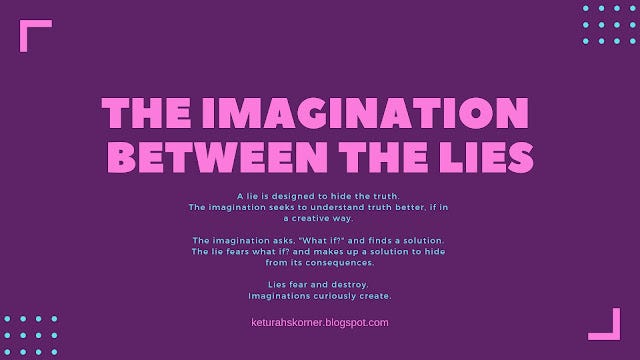The Imagination Between The Lies
Mrs. Henry was in the kitchen humming a song and kneading a lump of dough when she heard her children arguing. She wiped her floury hands on her apron and went to the edge of the room to spy on her children before scolding them.
Both of her sons faced each other, their fists clenched and ready to fight.
Jimmy's face flushed red with indignation as he yelled at his brother. "Mother said it's evil to lie!"
Billy, the elder of the two whispered, "Sh. Mother doesn't have to know."
Jimmy shook his head. "But God will know."
Mrs. Henry's heart swelled with pride. Both of her boys were good boys, but Jimmy was already showing a sign of loving God that touched her just where it felt wonderful. Billy, on the other hand . . . he was a difficult child.
The mother sighed making her presence known.
Both boys jumped, Billy so much that he wasn't even close to his younger brother anymore.
"What are you trying to make Jimmy do now?" Mrs. Henry asked.
Billy didn't answer, so Jimmy did. "He wants me to lie and not say anything about him cheating on his test. But I saw him asking Molly for help and she did all of his math problems."
"Billy," Mrs. Henry said not hiding her disappointment. "Is this true?"
Billy said, "No, Mother."
"Billy," Mrs. Henry's voice tightened. "What have we said about lying?"
"But Mother," Billy argued. "You lied to Mrs. Grant the other day when you told her you couldn't make it to her party because Papa wanted you to do something that day. Later I heard you say that you don't like Mrs. Grant and would use anything as an excuse to not be around her."
Mrs. Henry stammered for a moment. She touched her hot cheeks patting them with flour. But then she said, "That was only a white lie, Billy."
"A white lie?" Billy asked.
"Yes!" Mrs. Henry said, smiling to forget her shame. "It wasn't an evil lie, but a harmless one." And so Mrs. Henry proceeded to explain the differences between the two sorts of lies to her sons.
But little Jimmy couldn't understand how a fib could sometimes be a fib and other times not be one?

Which is worse, a black lie or a white lie? And is the imagination not just another sort of white lie?
Most would agree that a black lie is the greater of two evils, and the white lie so small that it hardly counts as evil. It might be evil, but it's so small and harmless . . .
Black lies are like vacuums that suck away all the light from one's life, leaving nothing but gaping emptiness. Such lies usually catch up to the offender quickly, sometimes before the lie has had a chance to complete its course.
From all appearances, a white lie is not near as harmful. Just a little snowflake that will melt as soon as it lands, and then never be remembered . . . or is that so?
What happens when snowflakes began to collect?
One snowflake onto another, piling and drifting into massive heaps of snow. Those snowflakes are what create avalanches. And once an avalanche has started there's no way to stop it.
A black lie is easy to spot and feel.
A white lie will consume one unawares.
I believe that there's no difference between the two sorts of lies, except that one is easier to hide for a time. But neither please God. I do believe there is a rare time for lies, and that such rare times, it's wrong to not lie; but these sort of lies are not designed to bring deceit but to protect life.
But what is the difference between a lie and an imagination?
All writers of fiction, who love theology, must eventually face this question at some point in their life.
"God says not to lie, so how can I tell a story that is not real?"
I think the first thing to do is define the difference between a lie and our imagination, and what each purpose to do.
A lie is designed to hide the truth. The imagination seeks to understand truth better, if in a creative way.
The imagination asks, "What if?" and finds a solution. The lie fears what if? and makes up a solution to hide from its consequences.
Lies fear and destroy. Imaginations curiously create.
But an imagination can be a corrupted lie. And such imaginations that create fiction do not write to show the truth but to glorify darkness. Such imaginations do not truly want to know what if but desire to make their own path separate from God's. Such imaginations are only curious about the dark things of Satan, not of the Father's creation.
For this reason, I think it's very important we keep our imaginations pure before God and submit our stories to Him. Because our stories should never add to the lies of the Devil, but bring light to God's ways.
For this reason, I believe we writers must be cautious.
We were given a gift of words. May we use our words to spread truth where lies have been pressed deeply. May we use our words to warm souls, not burn them. May we write to shine light upon every heart darkened by the lies of the world.
What are your thoughts about telling a white lie? And how do you disentangle fiction from a lie?




